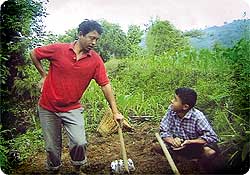 One of the most memorable documentary films shown at the recently concluded Film South Asia '03 in Kathmandu was "History For Winners" by the first-time documentary-maker Pranay Limbu.
One of the most memorable documentary films shown at the recently concluded Film South Asia '03 in Kathmandu was "History For Winners" by the first-time documentary-maker Pranay Limbu. The film profiles two singers impartially: Kuber Rai and Dhiraj Rai, both of whom talk about achieving success as singers. In the late 1980s and the early 90s, while Kuber was being hailed as a successor to Narayan Gopal and feted in Kathmandu's 'modern' music competitions, Dhiraj from Khotang was eking out an existence as a struggling artist, something he did for 12 long years. These days, however, Kuber bides his time, taking care of his farm in his village in Ilam (pic, top), with almost no hope of re-launching his musical career, while Dhiraj has established himself as a nationally recognised commercially successful pop icon.
Talking with some members of the audience after the show, I found that most were sympathetic to Kuber, and were quite dismissive of Dhiraj's success. To some extent, this was understandable. With an earnest face and early-morning practice sessions with his son at the harmonium, Kuber comes across as a hardworking, poor and serious singer, somehow deserving of commercial success. This image contrasts sharply with Dhiraj's who, with his hip-swaying song-and-dance routines, cheerful personality and willingness to talk to the press at all times, strikes any relatively elite documentary audience as, well, just fooling around and not making serious music. Even his success is somehow suspect. Yet I found Dhiraj quite intriguing for two business reasons.
First, his success says that gone are the days when raw talent alone-as in the case of late Narayan Gopal-carried an artist to the top of his profession in Nepal. With competition everywhere and the music industry coming up as a profitable business, success today needs talent to be packaged, managed, branded and sold to the marketplace, in the same way that a firm markets, say, detergent to customers. In this respect, Dhiraj's success provides a window to see the nature of rapidly changing, financially driven yet mutually lucrative intersections between commerce and the arts in Nepal.
And second, most of the times, Nepali artists themselves-no matter how supremely talented-are simply not able to play the marketing game. Their talent lies in singing and composing music in isolation, and not in marketing. They should not even have to play the management game anymore, as Kuber's failed attempts in the course of the film demonstrate. In today's changed times, Kuber and his cohorts now require the services of a new breed of opportunity-seeking professionals who, as agents, can help, for a fee, such talents to make strategic career decisions that have higher chances of leading to both critical and commercial success.
Else, in the absence of such agents, singers such as Kuber in spite of their stunning talent, are destined to slide into obscurity and despair, always blaming others of "unhealthy competition" and so on. But the main reason why Dhiraj's career is doing well is that he exhibits an uncanny ability to double up as his own agent, always pushing himself and his music in the marketplace. Yes, one may argue that Dhiraj is a better salesman than a singer, but that point is moot in front of his raging commercial success in Kathmandu, while his potential rival Kuber is back to herding goats in Ilam.
Many years ago, poet Laxmi Prasad Devkota wrote something to the effect that only in Nepal might Byron remain a farmer, while Shakespeare does manual labour and Shelly becomes a shopkeeper. What Devkota could not have foreseen was that to succeed commercially in 2003, even Byron, Shakespeare and Shelly, not to mention Kuber Rai, need agents who value their talent enough to help them navigate the channels of business so that they can be pushed to the marketplace for success.



